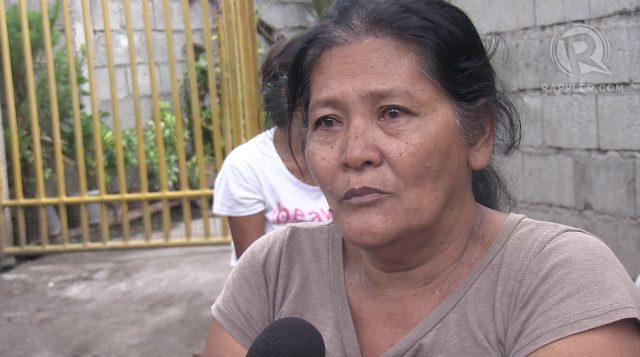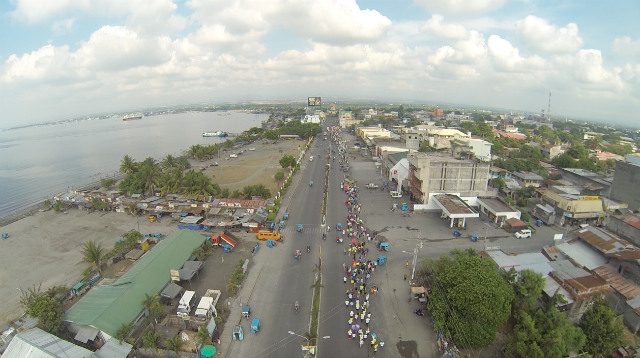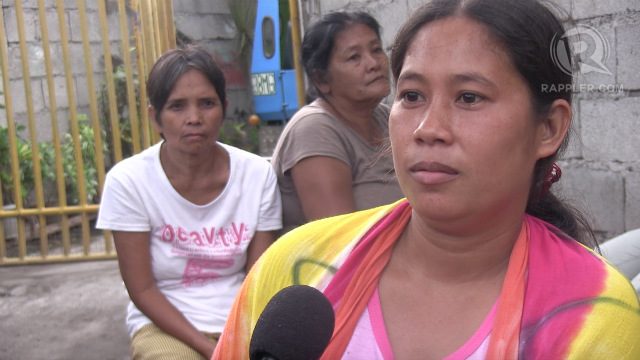SUMMARY
This is AI generated summarization, which may have errors. For context, always refer to the full article.

GENERAL SANTOS, Philippines – When 59-year-old Luciano Arcenal boarded a handline fishing vessel for a 10-day expedition to catch tuna in the deep sea in late March, his wife Dominica asked him to no longer go.
He was already frail, vulnerable to the risks accompanying a man his age.
But Luciano was insistent, recalled Dominica. After all, there was no money to buy food for the family and to help with the school expenses of their grandchildren.
“Another thing he knows how to do is make tuba (liquor made from coconout extract) from niyog (coconut), as a coconut picker. But there are no more coconuts, so he has to fish so we have money for rice. That’s our livelihood here in GenSan,” Dominica told Rappler in the vernacular.
Luciano and Dominica were married in 1974. Even before then, Luciano was already a fisherman.
Here in in General Santos City, the country’s known tuna capital, it has been this way for many men – whose fathers and fathers’ fathers are men of the sea.
In the village of Tambler, typically an hour away from the airport, the city boasts of tuna canning factories and fish processing firms whose products are for export.
It is for these companies that Luciano and other handline fishermen like him often earn their living from. Owners of the boats they sail with sell their catch at the fish port, where traders from different companies buy them fresh each morning.
Their catch – often sashimi-grade tuna – are considered one of the best in the world. (READ: European trade unions protest fish products from PH’s Citra Mina)

Seized boats
Two to 3 days after sailing in late March, the boat Luciano and some 8 other men were on was captured by Indonesian authorities for illegal fishing in Indonesian waters. Two other Philipine boats – with 7 to 9 handline fishermen on board – were seized around the same time.
The predominantly Muslim country under the leadership of President Joko “Jokowi” Widodo is on an aggressive campaign against illegal fishing, with seized vessels that illegally enter its waters being blown up or sunk by the navy.
On August 26 last year, Philippine fishing vessel Love Merben 2 was also seized in Indonesia for having an expired fishing permit. Its 43 crew members spent 6 months in detention, spending their Christmas and New Year away from their families in General Santos. (READ: DFA: Delay in helping fishermen due to lack of documents)
With the help of national labor center Sentro and subsidy from the Department of Foreign Affairs (DFA) for their return flight, the 43 fishermen were able to return home. (READ: DFA to bill Mindanao company for workers’ repatriation)
Sentro secretary general Josua Mata alleged that tuna exporting giant Citra Mina “abandoned” its 43 workers in Indonesia, but Citra Mina denied it had an employer-employee relationship with the Love Merben 2‘s crew. (READ: ‘Citra Mina ignored my family’s cry for help’)
Citra Mina explained its practice of just financing a local to install handline boats and recruit local fishermen so it can corner most of the boat’s fish catch. But the Department of Labor and Employment said both Citra Mina and its fish supplier would be liable for any labor offense against the recruited fishermen.
Women who wait
The arrest of her husband Luciano also brought bitter memories to Dominica.
She had already lost her son to handline fishing in 2014, when he was out at sea trying to catch squid as bait for tuna. He was hired by an Indonesian employer at that time.
“Because my child was lost. That’s why I cried because I don’t know where he is now. What I want is help so that wherever he is, my child can come home,” said Dominica.

In the village of Calumpang, two dozen other women shared to Rappler the sorry fate of their fishermen-husbands, all detained in Indonesia.
Shasha Namalata’s husband Wileonor was the captain of a boat seized in Indonesia. In their last conversation through radio, she said Wileonor told her he was hospitalized in Indonesia and had no one to care for him.
“Masakit dahil hindi ko na alam ‘yung gagawin ko (It hurt, because I no longer know what to do),” said Namalata.
Six months pregnant now, Namalata said she wants her husband to be beside her when she delivers their baby.
Depleting fish stocks
As it is, handline fishermen like Luciano are often subjected to hazardous working conditions and are rarely adequately compensated. (READ: Decent jobs? The case of Filipino handline fishermen)
Making matters worse, many of them often no longer find fish to catch within Philippine waters.
Dominica herself said Luciano in their early days of marriage was still able to catch fish near the fish port – an area locals call “Sentro” – with a cut of around P4,000.
These days, handline fishermen would need to fish in international waters to get that amount, she and other fishermen’s wives told Rappler.
On bad days, handline fishermen are forced to fish at the Philippines-Indonesia border, a common fishing ground for its abundance of yellowfin tuna.
“Because there is scarcity in Sentro. It’s as if there’s no fish. They can get fish faster if they are closer to Indonesia. Here in Sentro, there are no more fish,” Dominica explained.
Marine conservationists say the depletion of fish stocks, which negatively impacts livelihood in coastal communities, is a result of overfishing and seas degradation. (READ: Why we must protect our seas)
The cost of fishing in terms of gasoline and time increased over the years while the resulting yield relative to the cost is at its lowest since the 1950s, pro-environment group Greenpeace explained. (WATCH: PH oceans in crisis)
The volume of fish caught compared to fishing cost – known in conservation biology as Catch per Unit Effort (CPUE) – is steadily declining in the Philippines. (READ: Fisherfolk suffer from PH seas degradation)
All that Dominica and the other wives want is for the men who earn a living for their families to be back home.
“There’s nothing at Sentro. That’s why they run to Indonesia. But they hadn’t even gone into Indonesia, they were already caught,” she said. “All I want, Ma’am, is that I get help for my husband and child and all those who were caught…that somebody helps us. We just want our family to come home.” – Rappler.com
Add a comment
How does this make you feel?
There are no comments yet. Add your comment to start the conversation.